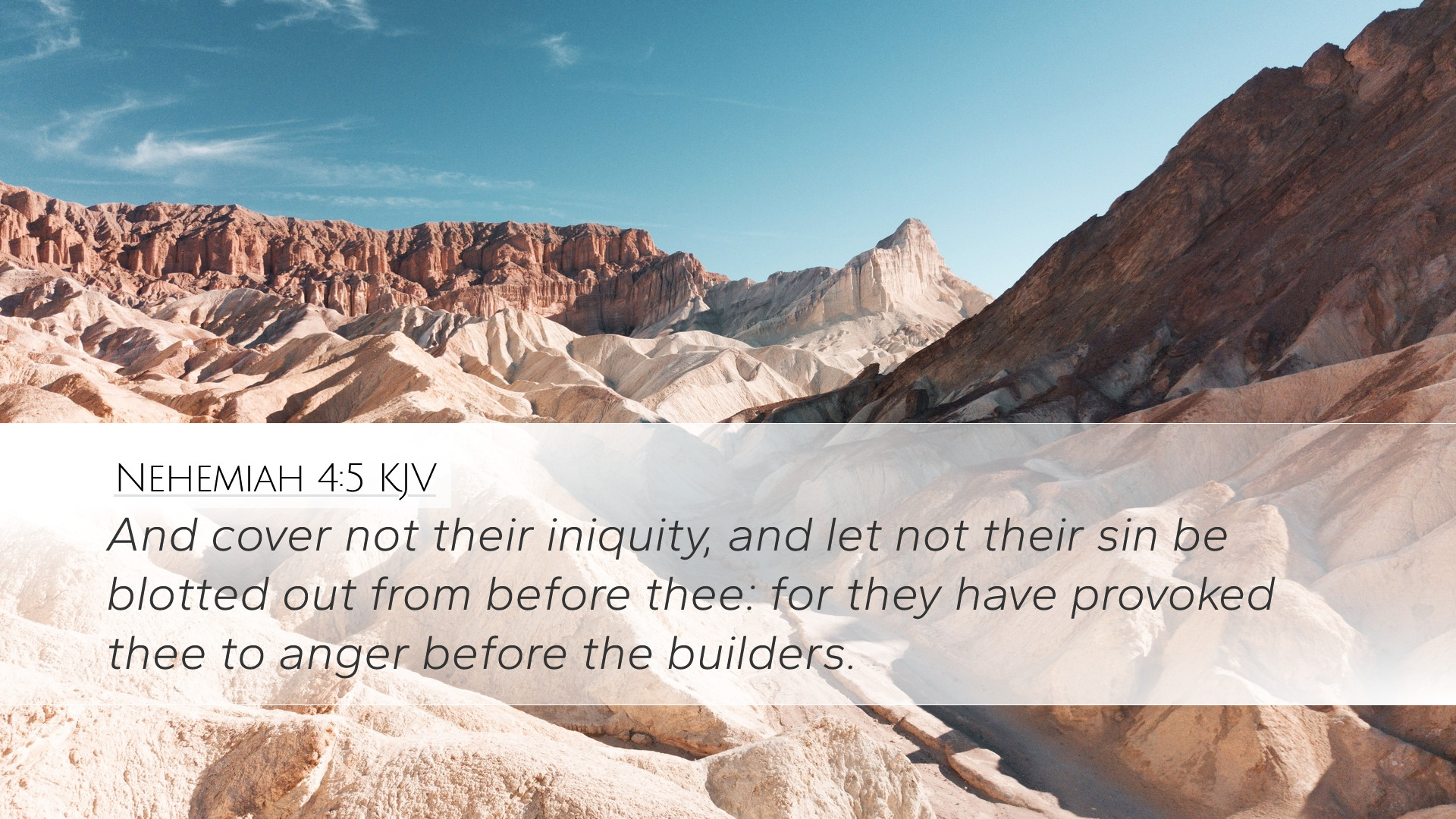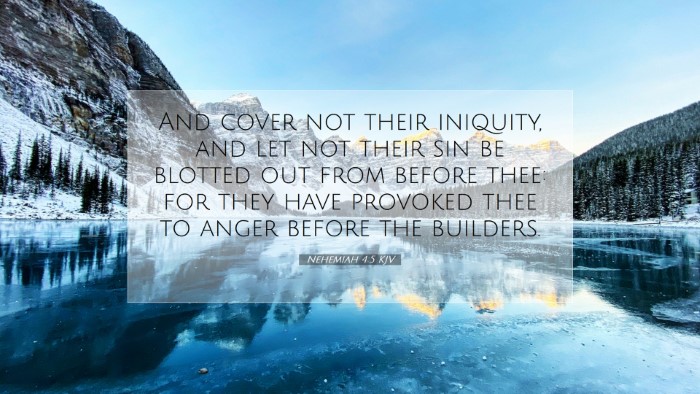Commentary on Nehemiah 4:5
Verse Reference: Nehemiah 4:5
"And cover not their iniquity, and let not their sin be blotted out from before thee: for they have provoked thee to anger before the builders."
Introduction
Nehemiah 4:5 presents a heartfelt plea from Nehemiah to God regarding the opposition faced by the Israelites as they sought to rebuild the walls of Jerusalem. This commentary seeks to explore the depth of Nehemiah’s request and its theological implications by drawing insights from respected public domain commentaries.
Context and Background
The book of Nehemiah often addresses themes of prayer, dedication, and leadership amidst adversity. In this particular chapter, Nehemiah and his fellow workers are combating both internal struggles and external threats as they strive to restore Jerusalem after the Babylonian exile. Understanding the socio-political context of this time is essential for interpreting the gravity of Nehemiah’s appeal to God.
Theological Insights
-
The Nature of Sin: As seen in Albert Barnes's commentary, Nehemiah underscores the seriousness of sin, particularly in the context of those opposing God’s work. Barnes notes that the appeal reflects an acknowledgment of the sinners' actions and the consequential divine judgment they warrant.
-
Divine Retribution: Matthew Henry emphasizes that Nehemiah calls for God's righteous judgment upon those who oppose His plans. This appeal points to a broader understanding of divine retribution, suggesting that those in rebellion against God will not escape the consequences of their actions.
-
Desperation and Supplication: Adam Clarke notes the intensity of Nehemiah’s situation. In dire circumstances, Nehemiah’s request is not merely a wish but a deep cry of desperation for divine justice against those who seek to hinder God's work. This reflects a profound understanding of the power and majesty of God in the face of opposition.
Expressions of Anger in the Text
The phrase "for they have provoked thee to anger" reveals Nehemiah's awareness of divine displeasure due to the actions of the adversaries. As noted by Henry, this indicates that opposition to God's people is ultimately an offense against God Himself. This recognition adds a layer of gravity to Nehemiah's plea, elevating his concern from a mere tactical response to a spiritual reality.
Implications for Leadership
Nehemiah’s leadership exemplifies the role of a godly leader who seeks God's intervention in times of conflict. His prayerful response is not just a personal practice but an exemplary model for anyone in a position of spiritual authority. Clarke points out that leaders must often stand in the gaps, invoking God’s justice when faced with opposition, showcasing the importance of prayer in leadership.
The Role of Prayer in Adversity
The text illustrates the importance of prayer during adversities—a theme echoed throughout Scripture. Nehemiah’s fervent prayer serves as a reminder that, during challenges, the faithful must turn to God for strength and resolution. Henry posits that prayer is both a cry for help and a statement of trust in God's sovereign power.
Application for Contemporary Believers
For modern-day believers, Nehemiah 4:5 challenges us to consider how we respond to opposition in pursuit of God’s purposes. The communal aspect of Nehemiah's plea highlights the importance of collective prayer and the responsibility of the faith community to support each other in times of challenge.
In application, believers are urged to recognize that resistance to God’s work is ultimately a resistance to God Himself, prompting a response that includes prayer for clarity, strength, and divine justice.
Conclusion
Nehemiah 4:5 serves as a somber reminder of the spiritual battles faced by those who endeavor to fulfill God’s will in a fallen world. The insights gleaned from public domain commentaries emphasize the seriousness of sin, the role of prayer, and the necessity for leaders to seek God’s intervention. Ultimately, this verse calls for a reflective engagement with God in entrusted leadership roles and an earnest plea for justice in times of trial.


